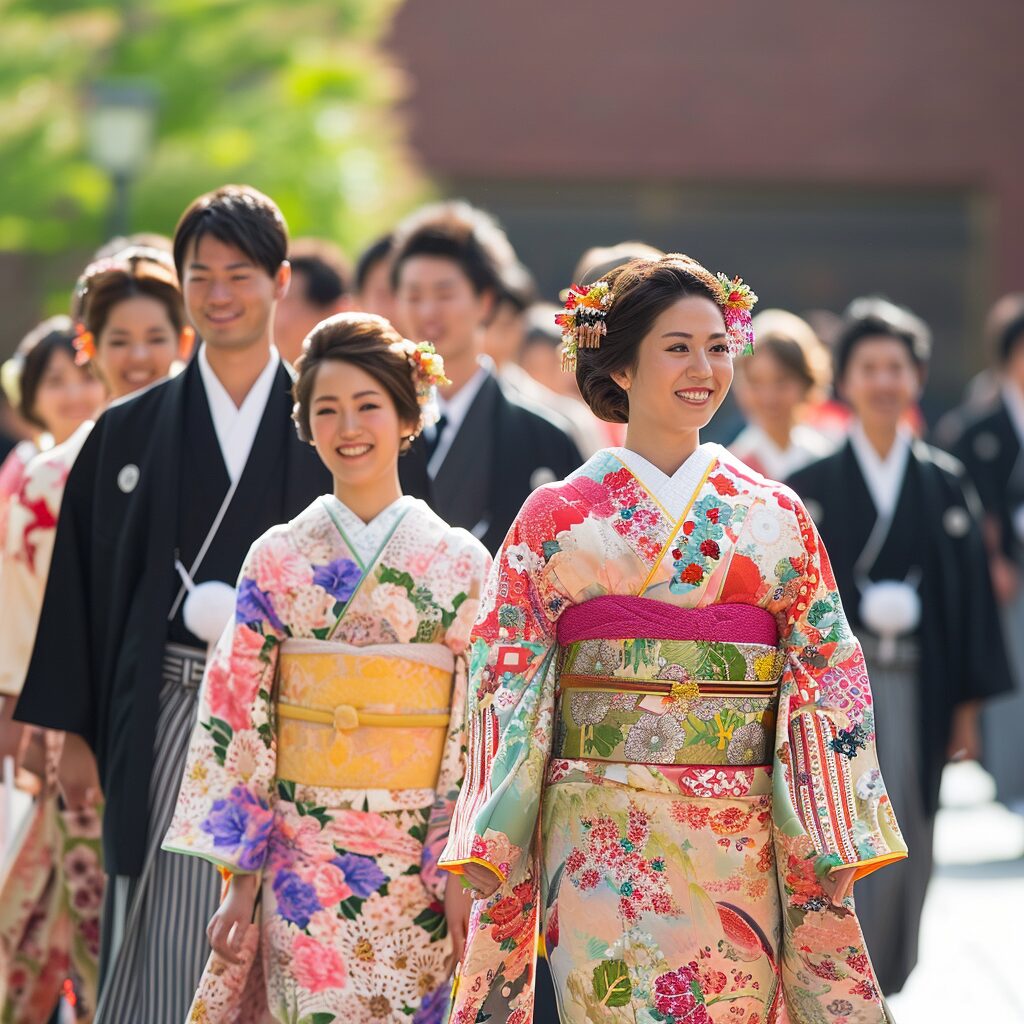英語で成人の日を紹介します。
実際の英会話例とともに、成人の日の基本情報を解説。
成人の日にまつわる基本的な情報に触れながら、実践的な英会話スキルも身につけることができます。
※後ろに和訳付の英文があります。
はじめに知っておくと役立つ情報
この英会話を読む前に知っておくと良い前提知識と情報です。
- 成人の日について
- 成人の日は、毎年1月の第2月曜日に祝われる国民の祝日です。この日は、その年に20歳になる若者たちを祝い、社会的な大人としての責任を迎える重要な節目を祝います。
- 振袖と袴
- 成人の日には、女性が伝統的な振袖(長い袖のある着物)を着用し、男性はスーツや袴(スカートのような形のズボン)を着ることが一般的です。これらの衣装は、日本の伝統と文化を象徴しています。
- 成人式
- 成人の日の主要なイベントであり、新成人が集まって公式な式典が行われます。地方自治体が主催し、様々な祝辞やスピーチが行われることが一般的です。
- 法的な成人年齢の変更
- 2022年4月に、日本では法的な成人年齢が20歳から18歳に引き下げられました。しかし、多くの地域では伝統的に20歳の成人を祝う習慣が続いています。
- 非公式な祝賀会
- 公式な式典の後には、友人や家族と一緒に非公式な集まりや食事会が行われることが多いです。
英語
2人が成人の日の祝賀行事とその文化的意義について話しています。
20歳になった若者が伝統的な衣装(女性は振袖、男性はスーツや袴)を着て、成人式に参加する様子を話題にしています。また、成人の日の公式な式典と非公式なお祝いについても触れています。
会話 / conversation

Hey Key, the city was quite lively yesterday with the Coming of Age Day celebrations, wasn’t it?

Yes, Mack. It’s a significant day for those turning 20, stepping into adulthood. The streets were filled with energy and color.

I noticed many young women wearing beautiful furisode kimonos. They looked so graceful.

Indeed. Wearing furisode is a traditional practice on this day. It represents their transition into adulthood and embracing their cultural heritage.

And the men in their suits or traditional attire added to the festive atmosphere.

rue. The day holds a lot of meaning. It’s not just about wearing traditional clothes; it’s about recognizing a new phase of life.

What happens at the official ceremonies? Are they all similar?

Well, each ceremony is unique, but generally, they’re about honoring the new adults. There are usually welcoming speeches by local officials.

And after the official part, they celebrate with friends and family?

Yes, they do. The day is a mix of formal recognition and informal celebrations. After the ceremony, it’s common to see them enjoying time with their loved ones.

It’s fascinating how Japan honors such traditions, despite changes like the legal adulthood age now being 18.

Absolutely, Mack. It’s a beautiful way to keep the cultural heritage alive and celebrate a major milestone in life.
関連情報 / related information
成人の日について

Introduction to Coming of Age Day
Celebrating Young Adults
Coming of Age Day in Japan, known as “Seijin no Hi,” is a special holiday that takes place on the second Monday of January each year. It’s a day to celebrate young people who turn 20, as this age marks their official entry into adulthood in Japanese society. This day is significant because 20-year-olds are recognized as full adults, with the rights and responsibilities that come with adulthood.
Traditions and Attire
Ceremonial Dress
A key part of the celebration involves traditional clothing. Women often wear “furisode,” a type of kimono with long sleeves, indicating they are single and of marriageable age. Men typically wear suits, but some choose to wear “hakama,” a type of traditional trouser. These clothes are not just outfits but symbols of cultural heritage and respect for tradition.
The Ceremony
Formal Celebrations
The day features official ceremonies organized by local governments. These ceremonies include speeches by local officials and are a formal recognition of the young adults’ new status. It’s a moment for the new adults to reflect on their responsibilities as members of society.
Informal Gatherings
After the Ceremony
After the official part of the day, many young adults spend time with friends and family. They might go out for meals, or have small parties. This mix of formal and informal celebrations makes Coming of Age Day a blend of tradition and modern socializing.
Cultural Significance
A Rite of Passage
Coming of Age Day is more than just a celebration; it’s a rite of passage. Even with the legal adult age changing to 18 in 2022, the day continues to be celebrated at 20. It shows the importance of tradition in Japanese culture and how it adapts over time. This day is a memorable and significant milestone in the lives of young Japanese adults.
和訳付
会話 / conversation

Hey Key, the city was quite lively yesterday with the Coming of Age Day celebrations, wasn’t it?
ねえKey、昨日は成人の日で街がとても賑やかだったね?

Yes, Mack. It’s a significant day for those turning 20, stepping into adulthood. The streets were filled with energy and color.
うん、Mack。20歳になる人たちが大人になる重要な日だからね。街はエネルギーと色彩でいっぱいだったよ。

I noticed many young women wearing beautiful furisode kimonos. They looked so graceful.
振袖を着た若い女性がたくさんいて、とても優雅だったね。

Indeed. Wearing furisode is a traditional practice on this day. It represents their transition into adulthood and embracing their cultural heritage.
本当だね。振袖を着るのは、この日の伝統的な習慣だよ。成人への移行と文化遺産を受け入れることを象徴しているんだ。

And the men in their suits or traditional attire added to the festive atmosphere.
スーツや伝統的な服装をした男性たちも、祭りの雰囲気を盛り上げていたね。

True. The day holds a lot of meaning. It’s not just about wearing traditional clothes; it’s about recognizing a new phase of life.
そうだね。この日は多くの意味を持っている。伝統的な服を着ることだけでなく、人生の新しい段階を認識することも含まれているんだ。

What happens at the official ceremonies? Are they all similar?
公式の式典ではどんなことが行われるの?全部同じようなもの?

Well, each ceremony is unique, but generally, they’re about honoring the new adults. There are usually welcoming speeches by local officials.
まあ、式典によって異なるけど、一般的には新成人を称えるものだよ。地元の役人から歓迎のスピーチがあることが多いね。

And after the official part, they celebrate with friends and family?
公式の部分の後、友達や家族と祝うの?

Yes, they do. The day is a mix of formal recognition and informal celebrations. After the ceremony, it’s common to see them enjoying time with their loved ones.
そうだよ。この日は、公式の認識と非公式のお祝いのミックスだね。式典の後は、愛する人たちとの時間を楽しむのが一般的だよ。

It’s fascinating how Japan honors such traditions, despite changes like the legal adulthood age now being 18.
成人の法定年齢が18歳に変更されたにもかかわらず、日本がこのような伝統を大切にしているのは魅力的だね。

Absolutely, Mack. It’s a beautiful way to keep the cultural heritage alive and celebrate a major milestone in life.
本当にそうだね、Mack。文化遺産を生き続けさせ、人生の大きな節目を祝う美しい方法だよ。
関連情報 / related information
成人の日について

Introduction to Coming of Age Day
Celebrating Young Adults
Coming of Age Day in Japan, known as “Seijin no Hi,” is a special holiday that takes place on the second Monday of January each year. It’s a day to celebrate young people who turn 20, as this age marks their official entry into adulthood in Japanese society. This day is significant because 20-year-olds are recognized as full adults, with the rights and responsibilities that come with adulthood.
若者の祝賀
日本の成人の日、「成人の日」は、毎年1月の第2月曜日に行われる特別な祝日です。この日は、20歳になる若者を祝う日で、この年齢は日本社会における公式な成人の始まりを意味します。20歳は成人としての完全な権利と責任が与えられる重要な時期です。
Traditions and Attire
Ceremonial Dress
A key part of the celebration involves traditional clothing. Women often wear “furisode,” a type of kimono with long sleeves, indicating they are single and of marriageable age. Men typically wear suits, but some choose to wear “hakama,” a type of traditional trouser. These clothes are not just outfits but symbols of cultural heritage and respect for tradition.
伝統的な衣装
祝賀の重要な部分は、伝統的な衣装に関係しています。女性は通常、「振袖」を着ます。これは長袖の着物で、独身で結婚適齢期であることを示します。男性は一般的にスーツを着ますが、「袴」という伝統的なズボンを選ぶ人もいます。これらの衣装は単なる服ではなく、文化遺産と伝統への敬意の象徴です。
The Ceremony
Formal Celebrations
The day features official ceremonies organized by local governments. These ceremonies include speeches by local officials and are a formal recognition of the young adults’ new status. It’s a moment for the new adults to reflect on their responsibilities as members of society.
公式な祝賀
この日は地方自治体によって組織される公式の式典が特徴です。これらの式典には地元の役人によるスピーチが含まれ、若者たちの新しい地位を公式に認めるものです。これは新成人が社会の一員としての責任を反映する瞬間です。
Informal Gatherings
After the Ceremony
After the official part of the day, many young adults spend time with friends and family. They might go out for meals, or have small parties. This mix of formal and informal celebrations makes Coming of Age Day a blend of tradition and modern socializing.
式典の後の集まり
公式な部分が終わった後、多くの若者は友人や家族と時間を過ごします。食事に出かけたり、小さなパーティーを開いたりすることもあります。この公式と非公式の祝賀のミックスが成人の日を伝統と現代的な交流の融合にしています。
Cultural Significance
A Rite of Passage
Coming of Age Day is more than just a celebration; it’s a rite of passage. Even with the legal adult age changing to 18 in 2022, the day continues to be celebrated at 20. It shows the importance of tradition in Japanese culture and how it adapts over time. This day is a memorable and significant milestone in the lives of young Japanese adults.
通過儀礼
成人の日は単なる祝賀以上のもので、通過儀礼です。2022年に法的な成人年齢が18歳に変更されたとしても、20歳で祝われる伝統は続いています。これは日本文化における伝統の重要性を示し、時代とともにどのように適応していくかを示しています。この日は、若い日本人の大人への重要な節目であり、忘れがたい瞬間です。
words & phrases
英会話ダイアローグと関連情報に出てきた単語・フレーズです(例文は各3つ)。

lively /ˈlaɪv.li/
意味: 活気のある、元気いっぱい。Full of life, energy, and activity.
例文:
The city streets are lively during the festival season.
祭りのシーズン中、街の通りは活気に満ちています。
Her lively discussion sparked interest in everyone.
彼女の活発な議論は、みんなの興味を引きました。
The park is always lively with children playing.
公園はいつも遊ぶ子供たちで活気づいています。
graceful /ˈɡreɪs.fəl/
意味: 優雅な、品のある。Characterized by elegance or beauty of form, manner, movement, or speech.
例文:
The dancers were very graceful on stage.
ダンサーたちは舞台上でとても優雅でした。
She moved in a graceful manner.
彼女は優雅な動きで移動しました。
The swan glided across the lake in a graceful way.
白鳥は湖を優雅に滑るように進みました。
attire /əˈtaɪər/
意味: 衣服、服装。Clothing or dress, especially of a distinctive or formal nature.
例文:
The wedding attire for the bride was stunning.
花嫁のウェディングドレスは見事でした。
Formal attire is required at the gala.
ガラではフォーマルな服装が必要です。
He chose traditional attire for the ceremony.
彼は式典のために伝統的な衣装を選びました。
socializing /ˈsoʊʃəˌlaɪzɪŋ/
意味:日本語: 交流、社交活動。人との交流やコミュニケーションを楽しむ活動。The activity of mixing socially with others. Enjoying communication and interaction with people.
例文:
Socializing with friends is my favorite way to relax.
友達と交流するのは私の好きなリラックス方法です。
After work, they often go socializing in the local bar.
仕事の後、彼らはよく地元のバーで交流します。
Socializing at parties can be fun and rewarding.
パーティーでの交流は楽しく、価値のあるものになります。
a rite of passage /ˈraɪt əv ˈpæsɪdʒ/
意味:通過儀礼。成長や社会的な地位の変化を祝う儀式や行事。A ceremony or event marking an important stage in someone’s life, especially birth, puberty, marriage, and death.
例文:
Graduation from university is a rite of passage for many students.
多くの学生にとって、大学の卒業は通過儀礼です。
The tribe has a rite of passage to welcome teenagers into adulthood.
その部族には、十代を成人として迎える通過儀礼があります。
Her first solo travel was like a rite of passage into independence.
彼女の初めての一人旅は、独立への通過儀礼のようなものでした。
